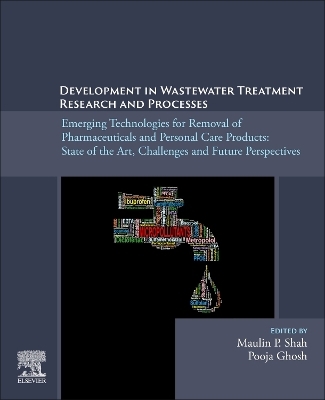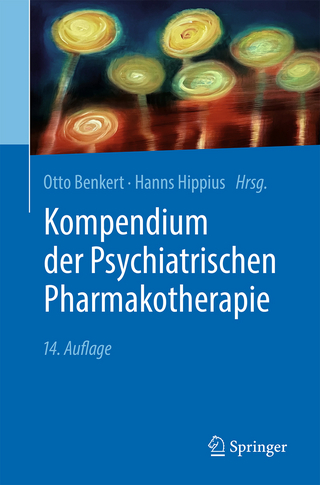
Development in Wastewater Treatment Research and Processes
Elsevier - Health Sciences Division (Verlag)
978-0-443-19207-4 (ISBN)
This book will help students and researchers in carrying out research on further advancements in the field, also helping them apply this to the real-world conditions.
Maulin P. Shah is a Microbial Biotechnologist with diverse research interest. His primary interest is the environment, the quality of our living resources and the ways that bacteria can help to manage and degrade toxic wastes and restore environmental health. Consequently, His work has been focused to assess the impact of industrial pollution on microbial diversity of wastewater following cultivation dependant and cultivation independent analysis. Pooja Ghosh did her Masters in Environmental Biology from University of Delhi, India followed by her doctorate in Environmental Microbiology and Biotechnology from Jawaharlal Nehru University, India. Her doctoral work involved risk assessment of landfill leachate from unengineered landfill sites and its treatment and detoxification. It contributed significantly in aiding policymakers, environmentalists, scientists, students, and most importantly, citizens, in realizing the problem of unengineered landfill sites of India. Currently, she is working as a DST-Inspire Faculty at Indian Institute of Technology Delhi, India and carrying out her post-doctoral research on energy recovery from municipal solid wastes using bioreactor landfill technology and assessing the environmental profiles and greenhouse gas emissions in the bioreactor landfill and comparing it with the alternative waste management options used in India using Life Cycle Assessment methodology. Her broad research interests include Solid waste management, Bioremediation, Wastewater treatment, Toxicology, Life cycle assessment and sustainability. She has published in over 20 peer-reviewed journals and book chapters, being cited 385 times with an h index of 11 and an i10 index of 12. She is a reviewer of Bioresource Technology, Science of the total environment, Environmental Science and Pollution Research, Ecotoxicology and Environmental Safety, Chemosphere and Journal of Environmental Management.
Section I: Environmental risk of Pharmaceuticals and personal care products 1. Global prevalence of Pharmaceuticals and personal care products (PPCPs) in the environment 2. Fate and transport of PPCPs to agricultural soils receiving reclaimed water 3. Uptake and translocation of PPCPs to fruits and vegetables 4. Ecotoxicology and health risk assessment due to exposure to PPCPs from different environmental matrices 5. Regulatory frameworks for PPCP pollution in the environment Section II: Analytical tools for detection of Pharmaceuticals and personal care products 6. Present challenges in detection of PPCPs and advancements Section III: Pharmaceuticals and personal care products in aquatic environment 7. Efficiency of conventional wastewater treatment technologies for removal of PPCPs 8. Advances in removal of PPCPs from aquatic environment Section IV: Adsorption based technologies for removal of Pharmaceuticals and personal care products 9. Development and application of Agro-waste based adsorbents for removal of PPCPs 10. Metal-organic frameworks as adsorbents for removal of PPCPs 11. Nanoadsobents for enhanced removal of PPCPs Section V: Bioremediation for removal of Pharmaceuticals and personal care products 12. Potential of Microalgae for removal of PPCPs 13. Application of Bacteria for removal of PPCPs: Insights into the mechanism using omics 14. Microbial fuel cells for augmented removal of PPCPs 15. Constructed wetlands for removal of PPCPs Section VI: Chemical remediation technologies for removal of Pharmaceuticals and personal care products 16. Advanced oxidation processes for removal of PPCPs 17. Photocatalytic degradation of PPCPs 18. Surfactants-based remediation for removal of PPCPs Section VII: Emerging technologies for removal of Pharmaceuticals and personal care products 19. Hybrid technologies for enhanced removal of PPCPs Section VIII: Sustainability of PPCP removal technologies 20. Field scale feasibility, Challenges, and future perspectives for tackling PPCPs 21. Life cycle assessment for understanding the sustainability of PPCP remediation technologies
| Erscheinungsdatum | 09.03.2024 |
|---|---|
| Verlagsort | Philadelphia |
| Sprache | englisch |
| Maße | 191 x 235 mm |
| Gewicht | 450 g |
| Themenwelt | Medizin / Pharmazie ► Medizinische Fachgebiete ► Pharmakologie / Pharmakotherapie |
| Naturwissenschaften ► Biologie ► Mikrobiologie / Immunologie | |
| Naturwissenschaften ► Chemie ► Technische Chemie | |
| Technik ► Umwelttechnik / Biotechnologie | |
| Wirtschaft | |
| ISBN-10 | 0-443-19207-3 / 0443192073 |
| ISBN-13 | 978-0-443-19207-4 / 9780443192074 |
| Zustand | Neuware |
| Informationen gemäß Produktsicherheitsverordnung (GPSR) | |
| Haben Sie eine Frage zum Produkt? |
aus dem Bereich


